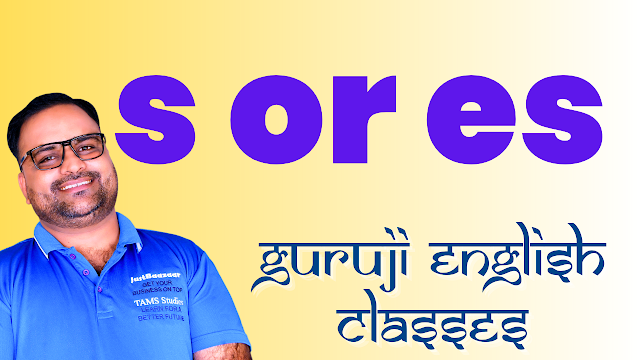Debunking the Absurdity of Adding 'S' or 'ES' with Third Person Singular - Insights from Sunil Chaudhary Guruji, Renowned English Language Guru
Greetings, language enthusiasts! Today, I, Sunil Chaudhary Guruji, your trusted English Language Guru, am here to unravel the mystery behind a rule that has perplexed learners for ages. We've all been taught that when referring to third person singular subjects like 'he,' 'she,' or any name, we must add an 's' or 'es' to the verb. But is this rule really necessary? I invite you to explore this topic with me as we demystify the notion and challenge its validity.
The 'Absurd' Rule: Let's start by examining the conventional grammar rule. According to traditional English grammar, when we talk about a single individual (third person singular), we add an 's' to most verbs. For example, 'he sings,' 'she dances,' or 'John writes.' But, is this grammatical addition truly essential to convey meaning effectively? The Absence of 'S' or 'ES': To debunk the so-called rule, let's consider the instances where we omit 's' or 'es' with verbs while discussing third person singular subjects. Take a look at these examples: "He speaks English fluently." "She runs marathons regularly." "John plays the guitar beautifully." In the above sentences, we deliberately chose not to add 's' or 'es' to the verbs, yet the meaning remains clear and unchanged. The number and gender of the subject are still evident. So, why should we be bound by a rule that seems to have no significant impact on understanding? Challenging the Status Quo: As language evolves, rigid grammar rules should be questioned and challenged. English, like any living language, undergoes transformations over time. It is crucial to adapt to these changes and embrace language that is more fluid and user-friendly. Misleading Implications: The 'adding s or es' rule might lead to some confusion and misunderstanding among learners, particularly those from non-English-speaking backgrounds. They may wonder why 'he runs' requires an 's,' but 'he eats' doesn't. This inconsistency can hinder the learning process and deter individuals from mastering the language. Simplifying Language Learning: As your English Language Guru, my mission is to simplify language learning and make it enjoyable for all. By questioning and challenging these 'absurd' rules, we can pave the way for a more logical and understandable English language learning experience. Conclusion: In conclusion, the notion of adding 's' or 'es' with third person singular subjects is not an absolute necessity. Language is a dynamic entity that should adapt to the needs of its users. By recognizing and embracing the logical simplicity of omitting 's' or 'es' in certain cases, we empower learners to grasp English more effectively. As Sunil Chaudhary Guruji, I encourage you all to approach language with an open mind, embracing change, and questioning rules that may no longer serve a practical purpose. So, let's continue our journey of language exploration, shedding light on the intricacies of English and celebrating the beauty of its evolution!
The 'Absurd' Rule: Let's start by examining the conventional grammar rule. According to traditional English grammar, when we talk about a single individual (third person singular), we add an 's' to most verbs. For example, 'he sings,' 'she dances,' or 'John writes.' But, is this grammatical addition truly essential to convey meaning effectively? The Absence of 'S' or 'ES': To debunk the so-called rule, let's consider the instances where we omit 's' or 'es' with verbs while discussing third person singular subjects. Take a look at these examples: "He speaks English fluently." "She runs marathons regularly." "John plays the guitar beautifully." In the above sentences, we deliberately chose not to add 's' or 'es' to the verbs, yet the meaning remains clear and unchanged. The number and gender of the subject are still evident. So, why should we be bound by a rule that seems to have no significant impact on understanding? Challenging the Status Quo: As language evolves, rigid grammar rules should be questioned and challenged. English, like any living language, undergoes transformations over time. It is crucial to adapt to these changes and embrace language that is more fluid and user-friendly. Misleading Implications: The 'adding s or es' rule might lead to some confusion and misunderstanding among learners, particularly those from non-English-speaking backgrounds. They may wonder why 'he runs' requires an 's,' but 'he eats' doesn't. This inconsistency can hinder the learning process and deter individuals from mastering the language. Simplifying Language Learning: As your English Language Guru, my mission is to simplify language learning and make it enjoyable for all. By questioning and challenging these 'absurd' rules, we can pave the way for a more logical and understandable English language learning experience. Conclusion: In conclusion, the notion of adding 's' or 'es' with third person singular subjects is not an absolute necessity. Language is a dynamic entity that should adapt to the needs of its users. By recognizing and embracing the logical simplicity of omitting 's' or 'es' in certain cases, we empower learners to grasp English more effectively. As Sunil Chaudhary Guruji, I encourage you all to approach language with an open mind, embracing change, and questioning rules that may no longer serve a practical purpose. So, let's continue our journey of language exploration, shedding light on the intricacies of English and celebrating the beauty of its evolution!

Comments
Post a Comment